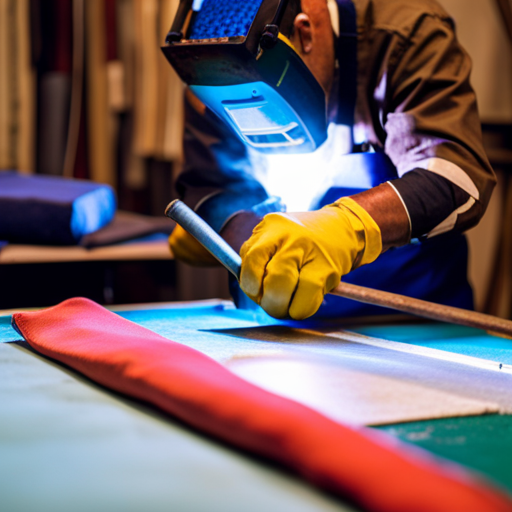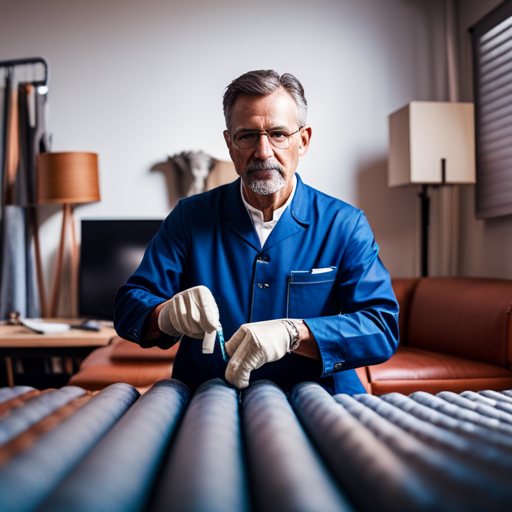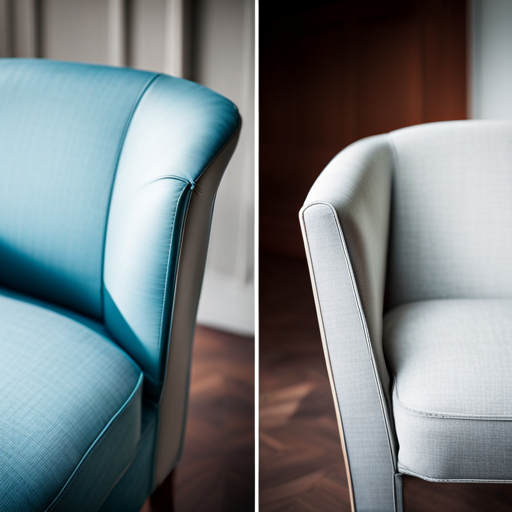The Role of Certifications in the Upholstery Welding Industry

In the upholstery welding industry, the phrase ‘separating the wheat from the chaff’ holds true when it comes to certifications. Upholstery welding certifications play a pivotal role in ensuring the highest standards of quality, safety, and compliance.
This article delves into the significance of certifications, their impact on career advancement, and the evolving landscape of the upholstery welding industry. Explore the essential role of certifications in shaping the future of this dynamic and vital profession.
Industry Demand for Certified Professionals
The upholstery welding industry is in need of professionals who are both certified in their craft and dedicated to upholding industry standards. With the industry experiencing significant growth, the demand for certified professionals is higher than ever. Upholstery welding is a specialized skill that requires a deep understanding of materials, techniques, and safety protocols. As the industry continues to expand, the need for professionals with up-to-date certifications becomes increasingly critical.
Professional development is key to staying abreast of the latest advancements in upholstery welding. Certifications not only validate an individual’s expertise but also demonstrate their commitment to continuous learning and improvement. Upholding industry standards and best practices is paramount in ensuring the quality and safety of upholstered products. Certified professionals play a vital role in maintaining these standards, thereby contributing to the overall growth and reputation of the industry.
Upholding Quality Standards
Upholding quality standards is crucial in the upholstery welding industry, where precision and durability are paramount.
Certifications play a vital role in ensuring that professionals adhere to industry standards, guaranteeing the quality of their work.
This adherence to quality standards has a significant impact on the industry as a whole, fostering trust among customers and driving the demand for certified professionals.
Certifications Ensure Quality
Certifications play a crucial role in ensuring the quality of upholstery welding by upholding industry standards. Upholstery welding certifications offer numerous benefits, such as validating the welder’s skills and knowledge, ensuring compliance with industry regulations, and enhancing customer confidence in the quality of work.
By obtaining industry qualifications, upholsterers demonstrate their commitment to upholding the highest standards of craftsmanship and safety. These certifications also serve as a benchmark for employers seeking skilled professionals, helping to maintain a standard of excellence within the industry.
Upholstery welding certifications not only validate the expertise of the welder but also contribute to the overall quality assurance and professionalism within the upholstery welding sector.
Therefore, certifications are essential in maintaining and improving the quality of upholstery welding.
Upholstery Welding Industry Standards
Upholstery welding industry standards are essential for maintaining the quality and safety of upholstered products. Upholstery welding requires adherence to specific standards to ensure the structural integrity and durability of the finished products.
Key aspects that contribute to upholding industry standards include:
-
Welding Techniques and Training: Upholding industry standards necessitates proficiency in welding techniques, which can be achieved through comprehensive training programs. This ensures that welders have the necessary skills to produce high-quality and secure welds.
-
Industry Regulations and Compliance: Adhering to industry regulations is crucial for ensuring that the manufacturing processes and materials used in upholstery welding meet the required standards. Compliance with these regulations is essential for maintaining product quality and safety.
-
Quality Assurance Protocols: Implementing quality assurance protocols is vital for consistently meeting industry standards. This includes rigorous testing, inspection procedures, and quality control measures to uphold the desired level of quality in upholstery welding.
Impact on Industry
The adherence to industry standards has a significant impact on the overall quality and safety of upholstered products within the welding industry. Upholding these standards ensures that products meet specific criteria for durability, strength, and performance, contributing to the reputation and trustworthiness of the industry.
By maintaining high-quality standards, the upholstery welding industry can foster industry growth and have a positive economic impact. Upholstered products that meet or exceed industry standards are more likely to gain consumer confidence, leading to increased sales and demand.
Furthermore, upholding quality standards can also reduce the risk of product recalls and liability issues, saving companies from potential financial losses. These factors collectively contribute to a thriving industry with sustainable economic growth.
This emphasis on quality and safety reinforces the importance of certifications in the upholstery welding industry.
Advantages of Upholstery Welding Certifications
Acquiring upholstery welding certifications provides professionals with a competitive edge in the industry and demonstrates their expertise and dedication to quality craftsmanship.
The advantages of obtaining these certifications include:
-
Career Advancement: Upholstery welding certifications open up opportunities for career growth and progression. Employers often seek certified professionals for supervisory and managerial positions, recognizing the value of their advanced skill set and commitment to excellence.
-
Industry Recognition: Holding upholstery welding certifications enhances professional credibility within the industry. It signifies a high level of competence and adherence to industry standards, earning the respect of peers, employers, and clients alike.
-
Expanded Job Prospects: Certified professionals enjoy a broader range of job prospects, as many companies prioritize hiring individuals with recognized certifications. This expanded pool of employment opportunities allows certified professionals to explore various sectors within the upholstery welding industry, from automotive upholstery to furniture manufacturing.
These advantages illustrate the significant impact that upholstery welding certifications can have on professionals. This recognition and expertise directly influence career opportunities and professional growth within the industry.
Impact on Career Opportunities
Earning upholstery welding certifications can significantly enhance professionals’ career opportunities within the industry, positioning them for advancement and increased recognition. With certifications, professionals demonstrate their commitment to excellence and their willingness to invest in their skills, making them more attractive candidates for promotions and new job opportunities. Employers often prioritize certified professionals for leadership roles, as they bring a higher level of expertise and credibility to the team.
Additionally, certifications can lead to higher earning potential, as they validate the individual’s proficiency in upholstery welding techniques, which can result in salary increases and better job offers.
Moreover, certified professionals are more likely to gain professional recognition within the industry. Upholstery welding certifications serve as a visible marker of expertise and dedication, setting certified professionals apart from their non-certified peers. This distinction can lead to increased respect from colleagues and employers, as well as opportunities to represent their companies at industry events or take on more challenging projects.
Certification Program Requirements
In the upholstery welding industry, certification program requirements play a crucial role in ensuring the competency and quality of upholsterers.
Mandatory skill assessments are essential to evaluate the proficiency of individuals in various welding techniques and practices.
Additionally, adherence to industry standards is critical to maintain consistency and safety across the upholstery welding sector.
Mandatory Skill Assessments
One crucial aspect of certification program requirements in the upholstery welding industry is the completion of mandatory skill assessments. These assessments are essential for skill validation and ensuring that professionals meet industry standards. The industry trusts that certified upholsterers have the necessary skills to perform high-quality welding work, making these assessments a critical part of the certification process.
Mandatory Skill Assessments:
-
Practical Welding Tests: Candidates must demonstrate their welding skills by performing various welding techniques and producing high-quality welds.
-
Knowledge Assessments: Upholsterers are evaluated on their understanding of welding principles, safety protocols, and industry regulations.
-
Quality Control Evaluation: Candidates are assessed on their ability to inspect and identify welding defects, ensuring their work meets industry standards.
Industry Standards Compliance
The industry standards compliance within the upholstery welding certification program requirements ensures that professionals adhere to established benchmarks, affirming their capability to deliver high-quality welding services.
Upholstery welding certification programs often mandate industry training to ensure that professionals are well-versed in the latest techniques and technologies.
Regulatory compliance is a crucial component of these certification requirements, as it ensures that welders adhere to safety protocols, environmental standards, and industry best practices.
Upholstery welding professionals are expected to demonstrate a comprehensive understanding of industry standards and regulations to guarantee the quality, safety, and compliance of their welding work.
Recognition and Credibility
Certifications’ role in the upholstery welding industry is crucial for establishing recognition and credibility within the profession. Upholstery welding professionals with recognized certifications demonstrate a commitment to upholding industry standards and best practices, enhancing their credibility among clients, employers, and peers.
The following points highlight the significance of certifications in fostering industry recognition and credibility:
-
Industry Acknowledgment: Upholstery welding certifications serve as a clear indicator of an individual’s expertise and adherence to industry-specific standards, thereby earning recognition within the upholstery welding community.
-
Quality Assurance: Certified professionals are perceived as trustworthy and competent, assuring clients and employers of their ability to deliver high-quality work, bolstering their credibility in the industry.
-
Competitive Edge: Possessing relevant certifications sets professionals apart in a competitive job market, signaling their commitment to excellence and industry-specific knowledge, further elevating their credibility within the upholstery welding sector.
Certifications not only establish recognition and credibility but also play a vital role in safety and compliance within the upholstery welding industry.
Role in Safety and Compliance
Professional upholstery welding certifications play a crucial role in ensuring safety and compliance within the industry. Upholstery welding involves working with various materials and tools, and safety training is paramount to prevent accidents and injuries. Certified welders are equipped with the knowledge of proper safety protocols, including the handling of equipment, the use of personal protective gear, and the identification of potential hazards. This not only safeguards the well-being of the workers but also contributes to a secure working environment.
Moreover, certifications also emphasize regulatory adherence, ensuring that welders are well-versed in industry standards and guidelines. Upholstery welding, like any other trade, is subject to specific regulations to guarantee the quality and safety of the produced work. Certified professionals are more likely to adhere to these regulations, reducing the risk of non-compliance, and potential legal issues for the business.
Additionally, compliance with regulations enhances customer trust and satisfaction, as it demonstrates the commitment to delivering work that meets industry standards. In essence, professional certifications in upholstery welding play a pivotal role in upholding safety standards and ensuring regulatory compliance within the industry.
Future of Upholstery Welding Certifications
Amid rapid technological advancements and evolving industry standards, the future of upholstery welding certifications is increasingly reliant on continuous adaptation and integration with emerging tools and techniques. Upholstery welding certifications must evolve to keep pace with the industry’s growth and future advancements.
-
Integration of Advanced Welding Technologies: Future certifications will likely encompass training on advanced welding technologies such as robotic welding systems and automated welding processes. Upholstery welders will need to demonstrate proficiency in operating and maintaining these advanced systems to meet industry demands.
-
Emphasis on Sustainable and Environmentally Friendly Practices: As the industry moves towards more sustainable practices, future certifications may include modules on environmentally friendly welding techniques and materials. Upholstery welders will need to showcase their knowledge of sustainable welding practices to align with industry trends and regulations.
-
Incorporation of Digital Skills: With the increasing digitization of the manufacturing sector, future certifications may require proficiency in digital skills such as computer-aided design (CAD) for welding projects and data analysis for quality control. Upholstery welders will need to adapt to the integration of digital tools and techniques into the welding process to stay competitive in the evolving industry landscape.
Frequently Asked Questions
What Are the Most Common Challenges Faced by Professionals Seeking Upholstery Welding Certifications?
Professionals seeking upholstery welding certifications often encounter challenges such as limited access to training programs, high costs, and varying certification standards. These obstacles can hinder career advancement and industry standardization.
Are There Any Specific Industry Trends That Are Driving the Demand for Certified Professionals in the Upholstery Welding Industry?
The demand for certified professionals in the upholstery welding industry is being driven by significant industry trends. Upholstery welding is experiencing a rise in demand for certified individuals, reflecting the industry’s increasing emphasis on quality and safety standards.
How Do Upholstery Welding Certifications Impact the Overall Reputation and Credibility of a Professional in the Industry?
Upholstery welding certifications significantly impact employment opportunities, industry recognition, and standards. They validate a professional’s expertise, ensuring compliance with industry standards and enhancing credibility. Certified professionals are in high demand, commanding respect and trust within the industry.
Are There Any Specific Areas of Safety and Compliance That Upholstery Welding Certifications Address?
Upholstery welding certifications address critical safety and compliance areas, covering industry standards, regulations, and advanced welding techniques. Upholding professional development, they mitigate certification challenges and enhance credibility, aligning with evolving technological advancements and industry demand for skilled professionals.
What Advancements or Changes Do Industry Experts Predict for the Future of Upholstery Welding Certifications?
Industry experts predict advancements in certification requirements for upholstery welding, including enhanced qualification standards to meet evolving industry needs. This may involve incorporating new technologies, regulatory updates, and a stronger emphasis on safety and sustainability.
Conclusion
In the ever-changing landscape of the upholstery welding industry, certifications serve as the sturdy framework, ensuring quality and safety.
Like a well-crafted weld, certifications provide the strength and reliability needed to uphold industry standards and open doors to new opportunities.
As the industry continues to evolve, the future of upholstery welding certifications shines brightly, illuminating the path for professionals to navigate with confidence and expertise.

Dillon Hince, an expert in the realm of upholstery welding, brings a wealth of knowledge and experience to the craft. As the driving force behind nodpu.com, Dillon combines a passion for precision and creativity, offering unique insights into the art of seamlessly melding fabrics and materials. With a commitment to excellence, Dillon Hince is your go-to resource for innovative upholstery welding techniques, transforming ordinary pieces into extraordinary works of functional art.





